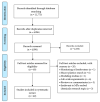Organic Pollutants Associated with Plastic Debris in Marine Environment: A Systematic Review of Analytical Methods, Occurrence, and Characteristics
- PMID: 36981806
- PMCID: PMC10048819
- DOI: 10.3390/ijerph20064892
Organic Pollutants Associated with Plastic Debris in Marine Environment: A Systematic Review of Analytical Methods, Occurrence, and Characteristics
Abstract
Plastic pollution has become one of the most serious environmental problems, and microplastics (MPs, particles < 5 mm size) may behave as a vehicle of organic pollutants, causing detrimental effects to the environment. Studies on MP-sorbed organic pollutants lack methodological standardization, resulting in a low comparability and replicability. In this work, we reviewed 40 field studies of MP-sorbed organic contaminants using PRISMA guidelines for acquiring information on sampling and analytical protocols. The papers were also scored for their reliability on the basis of 7 criteria, from 0 (minimum) to 21 (maximum). Our results showed a great heterogeneity of the methods used for the sample collection, MPs extraction, and instruments for chemicals' identification. Measures for cross-contamination control during MPs analysis were strictly applied only in 13% of the studies, indicating a need for quality control in MPs-related research. The most frequently detected MP-sorbed chemicals were polychlorinated biphenyls (PCBs), polycyclic aromatic hydrocarbons (PAHs), and organochlorine pesticides (OCPs). Most of the studies showed a good reliability (>75% of the total score), with 32 papers scoring 16 or higher. On the basis of the collected information, a standardizable protocol for the detection of MPs and MP-sorbed chemicals has been suggested for improving the reliability of MPs monitoring studies.
Keywords: beach; microplastics; organic pollutants; seawater.
Conflict of interest statement
The authors declare no conflict of interest.
Figures






References
-
- Plastics Europe Plastics—The Facts 2020. 2020. [(accessed on 31 December 2022)]. Available online: https://plasticseurope.org/knowledge-hub/plastics-the-facts-2020/
Publication types
MeSH terms
Substances
LinkOut - more resources
Full Text Sources

